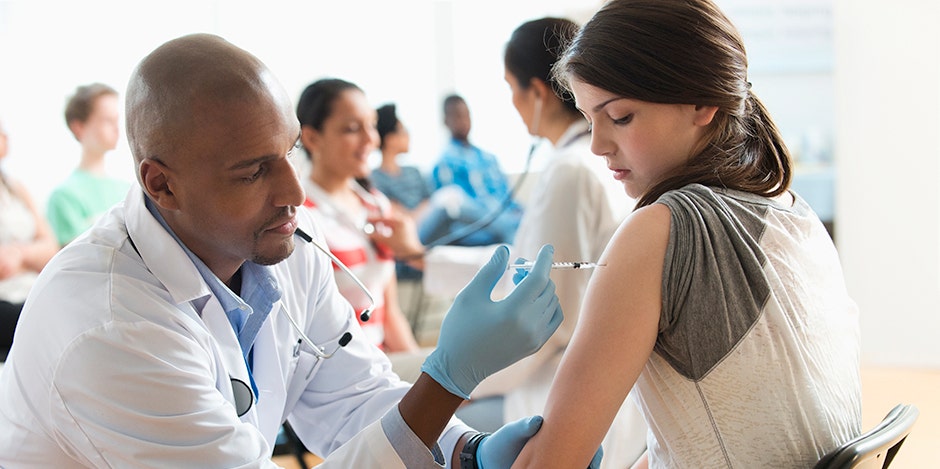Why Coronavirus May Change The Way Anti-Vaxxers Think About Contagious Diseases
Are we all ready to start believing in vaccines?
 Getty Images
Getty Images For the past six or more weeks, our lives have been dictated by the rampant spread of COVID-19. While there is currently no definitive timeline for when the world can be up and running again, most scientists have made it clear that the world cannot return to normal life until a vaccine is discovered.
While we await such a breakthrough, the situation is getting worse globally. The number of confirmed coronavirus cases worldwide has surpassed 2.6 million with the death toll reaching over 180,000 according to John Hopkins University.
So what about people in the anxi-vaccine movement? Could the pandemic change what anti-vaxxers think about coronavirus and diseases?
The anti-vaxx movement has garnered a lot of media attention in recent years, vocalizing concerns over the possible side effects of vaccinations. The group insists upon vaccines being a mere economic pursuit, overlooking the necessity of these preventative medicines.
Yet, the future of human life may currently be in the hands of the vaccination researchers who have received backlash in recent years from this group.
This is what the world looks like without one vaccine. So, how would the world look without all vaccines?
Long before the novel coronavirus, smallpox was one of the world's most deadly diseases. In the 20th Century alone, more than 300 million people died of smallpox before a vaccine eradicated the disease in 1979. Edward Jenner, the inventor of this vaccine, is credited with saving the most human lives of anyone else in history.
A global vaccination campaign for measles that began in 2000 resulted in a 73 percent drop in deaths from the illness by 2018, according to the World Health Organization.
And yet, skepticism persists.
Last year, the World Health Organization identified “vaccine hesitancy” as one of the top ten threats to global health. This was a direct result of a 30 percent surge in cases of measles in 2019, reversing the work of decades of immunization.
The anti-vaxx movement remains one of the most vocal and baffling movements of the last decade.
Social media has mobilized this movement in recent years; these self-proclaimed “vaccine choice” supporters have expressed outrage towards mandatory vaccinations in schools.
Though this movement existed since the invention of vaccines, the recent rise of anti-vaxx sentiment is credited to an unsubstantiated study linking vaccines to autism in children. This study, carried out by physician-researcher Andrew Wakefield, has become one of the most damaging pieces of research in medicine.
Autism researchers have shown decisively that the developmental disorder is not caused by vaccines. The study was later retracted and Wakefield was stripped of his medical license.
Still, the false data and insufficient research in the paper, while rejected in the scientific world, helped fuel a dangerous movement of vaccine skepticism and refusal globally.
It begs the question: how are anti-vaxxers responding to the current pandemic?
Across the world, people are taking precautionary methods to prevent the spread of COVID-19. They are quarantining and social distancing as per government recommendations.
But the pandemic has polarized anti-vaxxer’s opinions, according to Professor Heidi Larson, the founder of the London-based Vaccine Confidence Project. “For people on the fence who see this as a real threat, they would want the vaccine,” she said.
Professor Larson researches millions of social media posts daily to get an insight into how the pandemic is influencing opinions.
“The big difference is that this is a very visceral, real and tangible disease threat, whereas a lot of the childhood diseases vaccines prevent are less evident to parents. That doesn’t work with COVID-19. That’s a very real threat. For those weighing any risk of the vaccine over the risk of the disease, the equation is totally different with this one,” she adds.
Even President Trump, who has previously expressed hesitancy towards vaccines, has made his impatience for a definitive vaccine clear in a recent press conference. “Do me a favor: speed it up, speed it up,” he urged.
For others, this pandemic has only consolidated their views. Tweets and statements from celebrities have fuelled conversations.
UK rapper M.I.A tweeted about her hesitancy towards vaccines, while high-profile tennis player Novak Djokovic said in a live Facebook chat: “Personally I am opposed to vaccination and I wouldn’t want to be forced by someone to take a vaccine in order to be able to travel.”
Across America, people are defying stay-at-home orders and protesting — anti-vaxxers among them.
Dr. David Robert Grimes, a cancer researcher and author who writes on critical thinking, believes die-hard anti-vaxxers are not going to change their mind.
“It’s crucial to note that it will not change the mindset of the dedicated anti-vaccine core — they have existed since the time of Jenner. Their stance is an identity rather than reasoned position, and you cannot reason someone out of a position they never reasoned themselves into in the first instance. Already, they’re claiming COVID-19 is a hoax, or a scam to sell more vaccines.”
This is a dangerous mindset for the future. Achieving herd immunity for disease and viruses requires at least 90 to 95 percent of the population to be vaccinated, meaning vaccines could be our only chance at eradicating coronavirus.
Until a vaccine is found, we cannot estimate how these anti-vaxxers will react.
The only hope is that science will carry out accurate and safe research when looking for a coronavirus vaccine so the anti-vaxx movement is not fearful of side effects and dangers.
Alice Kelly is a writer with a passion for lifestyle, entertainment and trending topics.
